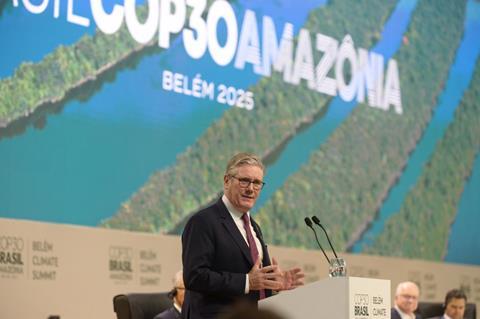Laure Philippon of campaign group ShareAction calls for pension schemes to use their clout to make sure the discussions from COP30 become meaningful action on climate change.

This week, all eyes are on Belém, Brazil, where the COP30 Climate Summit highlights the urgent need for global climate action. While policymakers take centre stage, the vital role of pension funds in addressing climate change should not be overlooked.
Inaction carries serious consequences: the Climate Policy Initiative warns climate change could shrink global economic output by 15% by 2050 and 30% by 2100; other estimates suggest economic losses could be significantly higher. Extreme weather events – from heatwaves to floods – are already damaging the homes and livelihoods of pension savers worldwide.
Pension funds have important reasons to manage long-term climate and financial risks. Their fiduciary duty to act in savers’ best interests should align with investing for sustainable, long-term returns. For younger savers in particular, pursuing short-term gains from high-emission activities risks undermining the very systems on which future prosperity depends.
So what could – and should – pension funds be doing?
Vote against company directors

ShareAction’s analysis shows that support for shareholder resolutions aimed at tackling environmental issues has fallen dramatically in the last four years. It’s clear that these resolutions alone aren’t enough to drive change at the scale and pace we need.
However, investors don’t just vote on shareholder resolutions; they also vote on the re-election of directors.
Pension funds need to use this power to hold companies – and specifically the people who run them – accountable for their climate impacts.
They can do this by setting out the minimum standards for companies to meet on climate change and the energy transition and integrating ‘red lines’ into voting policies. These should make clear that they will oppose the re-appointment of directors who fail to implement those standards.
These voting expectations should also be the standard for pension funds’ asset managers. If an asset manager isn’t voting in the long-term interests of all beneficiaries, it may be time to find a new asset manager.
The untapped power of pension bondholders
Many pension funds have extensive investments in corporate bonds. The potential for bondholder influence is significant because, unlike equity, companies are continually issuing new bonds – and investors can make access to this financing conditional on the climate commitments made by the issuers.
Although approximately 90% of new financing for fossil fuel expansion comes from loans and bonds, there are investment options that would not finance fossil fuel expansion. For example, the University of Cambridge’s impending global bond index.
With tools such as this, corporate bond investments can and should be at the heart of pension funds’ stewardship strategies. They must engage with companies not only on their equity holdings but also on their fixed income investments, and make continued investment conditional on meaningful, climate-focused transition.
From portfolios to policy

Pension funds can also drive better policy-making and should urge the government to take the policy action needed to ensure a rapid energy transition.
This engagement has to go beyond simply responding to government consultations. If the situation calls for better legislation or regulation, pension schemes should support this.
That’s why ShareAction has been campaigning alongside pension funds to support the amendment tabled by Labour MP Liam Byrne to the Pension Schemes Bill, calling for clarification of UK fiduciary duty law. This is vital for empowering all pension funds to effectively manage systemic climate risks for their beneficiaries.
With our chances of meeting the 1.5°C temperature goal slipping away, it’s clear that ambition is not where it needs to be in this critical decade for global climate action.
COP30 may be making headlines now, but for us, the key moment will be when the financial sector fully unleashes its power to turbocharge the transition to net zero.
Laure Philippon is head of investor engagement at ShareAction.

























